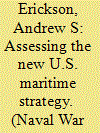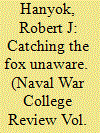| Srl | Item |
| 1 |
ID:
085778


|
|
|
|
|
| Publication |
2008.
|
| Summary/Abstract |
The new U.S. maritime strategy embodies a historic reassessment of the international system and how the nation can best pursue its interests in harmony with those of other states. In light of the strategy's focus on building partnerships to better safeguard the global maritime commons, it is vital that American leaders clearly understand the frank and unvarnished views of allies, friends,
and potential partners. The strategy's unveiling at the Naval War College on 17 October 2007 with the leaders of nearly a hundred navies and coast guards present demonstrated initial global maritime inclusiveness.
|
|
|
|
|
|
|
|
|
|
|
|
|
|
|
|
| 2 |
ID:
085783


|
|
|
|
|
| Publication |
2008.
|
| Summary/Abstract |
The attack on the U.S. Pacific Fleet by the aircraft of the Japanese Striking Force (Kido Butai) at Pearl Harbor on the morning of 7 December 1941 was a total surprise to the American commands in Hawaii and Washington. The completeness of the operational surprise-the Imperial Japanese Navy had gathered the force, trained it, concentrated it, and sent it to the launch point without discovery by American intelligence, especially its radio component- was due largely to the success of the Japanese cover plan of radio denial and deception in hiding the existence, makeup, purpose, and timing of the attack. The Japanese navy's denial and deception plan left American radio intelligence, known also as "communications intelligence," with only scraps of information about the Japanese fleet's movements during the weeks prior to the attack.
|
|
|
|
|
|
|
|
|
|
|
|
|
|
|
|
| 3 |
ID:
085784


|
|
|
|
|
| Publication |
2008.
|
| Summary/Abstract |
Throughout the decade of the 1990s, the U.S. Navy and Marine Corps spent considerable time and energy attempting to define their roles in a new security environment created by the end of the Cold War. The decline of Soviet power, accentuated by large cutbacks in military spending and a withdrawal fromCentral and Eastern Europe, left the United States without a peer competitor politically, diplomatically, ormilitarily-on the world scene.1 As ideas and concepts churned throughout the Department of Defense, the Navy andMarine Corps issued a series of strategic and operational concept papers that defined the new security environment along with the roles and missions of the sea services.
|
|
|
|
|
|
|
|
|
|
|
|
|
|
|
|
| 4 |
ID:
085777


|
|
|
|
|
| Publication |
2008.
|
| Summary/Abstract |
From the perspective of the U.S. Department of Defense, Europe has been the world's "safe" region for several years. After the tumult and disorder that plagued the Balkans in the 1990s, resulting in two majorNATO-led military operations in Bosnia and Kosovo, in 1995 and 1999, respectively-Europe has been viewed as a peaceful, stable environment for American forces and interests.When European Command is compared with Central Command,with its ongoing wars in Iraq and Afghanistan, Europe unquestionably and justifiably appears safe and happy; even the least-developed corners of Europe lack the endemic human security issues that plague portions of Africa, Asia, and South America
|
|
|
|
|
|
|
|
|
|
|
|
|
|
|
|
| 5 |
ID:
085782


|
|
|
|
|
| Publication |
2008.
|
| Summary/Abstract |
In the European theater of World War II, 1942 marked the nadir of Allied fortunes. German forces in the Soviet Union had reached Stalingrad and threatened the oil fields of the Caucasus; Axis forces in Africa seemed on the verge of pushing the British out of Egypt; and German U-boat wolf packs preyed on Allied shipping with relative impunity. Late in 1942, however, two significant Allied successes served to turn the tide against the Axis powers.
|
|
|
|
|
|
|
|
|
|
|
|
|
|
|
|
| 6 |
ID:
085779


|
|
|
|
|
| Publication |
2008.
|
| Summary/Abstract |
In order to cope with threats and safeguard U.S. interests, the new U.S. maritime strategy puts forward six major missions for sea power: deploy
decisive sea power in a forward position in limited conf licts of regional
scale; deter war between major powers; win wars for the nation; safeguard
homeland security from long-distance; promote and maintain cooperative
relationships with more international partners; and prevent or eliminate
regional destruction before it affects the international system.
|
|
|
|
|
|
|
|
|
|
|
|
|
|
|
|
| 7 |
ID:
085781


|
|
|
|
|
| Publication |
2008.
|
| Summary/Abstract |
On 17 October 2007, the new maritime strategy, jointly drafted by the U.S. Navy, Marine Corps, and Coast Guard, was formally introduced at the United States Naval War College in Rhode Island. The U.S. Department of Defense website published the full text simultaneously. This important strategic report is titled "21st Century Sea Power Cooperation Strategy" [A Cooperative Strategy for 21st
Century Seapower]. This is the fi rst time in history that the three joint forces have formulated a unifi ed maritime strategy. This strategy report represents the first major revision of U.S. maritime strategy in over twenty years. The 1986 U.S. maritime strategy was developed in the latter part of the Cold War, and was a strategy of "war at the core," for the purpose of establishing maritime hegemony
for the global fi ght against the Soviet navy. Obviously, with the breakup of the Soviet Union and the decline of the Soviet navy, the "1986 Edition" of the U.S. maritime strategy has become obsolete.
|
|
|
|
|
|
|
|
|
|
|
|
|
|
|
|
| 8 |
ID:
085780


|
|
|
|
|
| Publication |
2008.
|
| Summary/Abstract |
The new U.S. "maritime strategy" focuses on future security threats. It not only puts forward some new concepts, but also demonstrates many aspects of future military strategic adjustment and the development trends of military transformation.
|
|
|
|
|
|
|
|
|
|
|
|
|
|
|
|